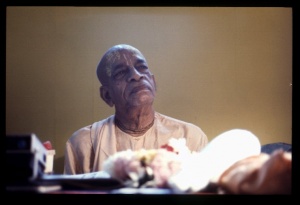CC Antya 6.217: Difference between revisions
No edit summary |
(Vanibot #0054 edit - transform synonyms into clickable links, which search similar occurrences) |
||
| Line 17: | Line 17: | ||
<div class="synonyms"> | <div class="synonyms"> | ||
''ei-mata'' | ''[//vanipedia.org/wiki/Special:VaniSearch?s=ei&tab=syno_o&ds=1 ei]-[//vanipedia.org/wiki/Special:VaniSearch?s=mata&tab=syno_o&ds=1 mata]'' — in this way; ''[//vanipedia.org/wiki/Special:VaniSearch?s=sarva&tab=syno_o&ds=1 sarva]-[//vanipedia.org/wiki/Special:VaniSearch?s=kāla&tab=syno_o&ds=1 kāla]'' — for all time; ''[//vanipedia.org/wiki/Special:VaniSearch?s=āche&tab=syno_o&ds=1 āche]'' — is; ''[//vanipedia.org/wiki/Special:VaniSearch?s=vyavahāra&tab=syno_o&ds=1 vyavahāra]'' — the etiquette; ''[//vanipedia.org/wiki/Special:VaniSearch?s=niṣkiñcana&tab=syno_o&ds=1 niṣkiñcana] [//vanipedia.org/wiki/Special:VaniSearch?s=bhakta&tab=syno_o&ds=1 bhakta]'' — a devotee who has no other support; ''[//vanipedia.org/wiki/Special:VaniSearch?s=khāḍā&tab=syno_o&ds=1 khāḍā] [//vanipedia.org/wiki/Special:VaniSearch?s=haya&tab=syno_o&ds=1 haya]'' — stands; ''[//vanipedia.org/wiki/Special:VaniSearch?s=siṁha&tab=syno_o&ds=1 siṁha]-[//vanipedia.org/wiki/Special:VaniSearch?s=dvāra&tab=syno_o&ds=1 dvāra]'' — at the gate known as Siṁha-dvāra. | ||
</div> | </div> | ||
Latest revision as of 20:47, 19 February 2024
Śrī Caitanya-caritāmṛta - Antya-līlā - Chapter 6: The Meeting of Śrī Caitanya Mahāprabhu and Raghunatha dasa Gosvāmī

His Divine Grace
A.C. Bhaktivedanta Swami Prabhupada
A.C. Bhaktivedanta Swami Prabhupada
TEXT 217
- ei-mata sarva-kāla āche vyavahāra
- niṣkiñcana bhakta khāḍā haya siṁha-dvāra
SYNONYMS
ei-mata — in this way; sarva-kāla — for all time; āche — is; vyavahāra — the etiquette; niṣkiñcana bhakta — a devotee who has no other support; khāḍā haya — stands; siṁha-dvāra — at the gate known as Siṁha-dvāra.
TRANSLATION
Thus it is a custom for all time that a devotee who has no other means of support stands at the Siṁha-dvāra gate to receive alms from the servants.